|
CRUISING CUBA & ITS NEIGHBORS
30 NOVEMBER - 10 DECEMBER
2018
| /tr>
AT SEA
Monday, December 3. This was a most welcome day at sea. We were happy to have a chance to
recuperate from our hectic two days in Havana. Even so, we were up at 7:30. We had both
breakfast and lunch in the dining room, the only time for either on the cruise. The dining room
had a Bistro menu available for lunch to make up for the fact that the Sirena was too small to
have a separate Jaques’ Bistro as Oceania’s larger ships do. It had an all-French menu.
We went to Sandy's lectures at ten (Cuba from Discovery to Revolution) and two (Cienfuegos: the French
connection). The free wi-fi in our cabinwas worthless, so Darrell went up to the computer room
to check our email.
At 7:00 we had diner in the Tuscan Steak, one of the ship's two limited access restaurants. This
one combined the elements of the Italian and steak restaurants found on Oceania’s larger ships.
We both had rack of lamb as our entree. The food was outstanding. There was a 9:00 p.m.
musical show in the lounge, but we did not want to rush our dinner to get there.
TRINIDAD DE CUBA

Jose Marti Parque from ship |
Tuesday, December 4. At 7:00
a.m. the ship docked at Cienfuegos cruise port, right in the middle of the city.
From the ship we could see buildings in ,Jose Marti Parque, the city center.
Cienfuegos, the Pearl of the South, is relatively new, founded by the French in 1819. It is
very interesting in its own right, but we had signed up for a tour to Trinidad
de Cuba, three centuries older, an 80 minute drive southeast along the coast, so we did not
see much of Cienfuegos until later.
We had to be in the lounge by 7:30 for our 8:00 departure, so we ordered breakfast in our room again, this time for
6:30. The drive along the coast was itself enjoyable. It was very flat around Cienfuegos but
eventually small hills appeared and then the Escambray Mountains. The road was only two
narrow lanes, and we were frequently forced to follow a horse or donkey cart for miles.
It was already 10:30 by the time we drove into Trinidad.
Trinidad, founded by the Spanish in 1514, is known for its colonial old town and cobblestone
streets and its neo-baroque main square, Plaza Mayor. It is a UNECO World
heritage site. Unfortunately, our guide was not very efficient with our limited time.
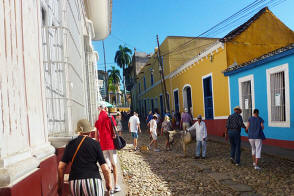
Walking up to Plaza Major |
Upon
getting off the bus, we straggled up a narrow cobblestone street to the Plaza
Major, but the guide never even mentioned what it was. This beautiful Plaza was surrounded by grand colonial buildings.
In the center, directly in front of us, were the restored Palacio Brunet (1812)
(now the Museo
Romántico) and the Iglesia de la Santísima
Trinidad (Church of the Most Holy Trinity)(1872), surprisingly for this
location, the
largest church in Cuba. To our left was the Church and Monastery of Saint Francis (1813),
and to our right was the Casa de Sanchez Iznage. The latter originally was
two, separate homes belonging to sugar barons, but it now houses the Museum
of Colonial Architecture.
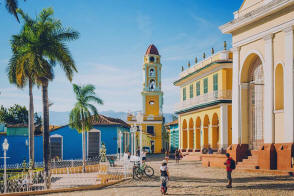
St. Francisco tower, Palacio Brunet &
Trinity Church |

Palacio Brunet &
Trinity Church |
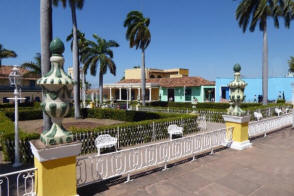
Casa de Sanchez Iznaga
Museo de
Arquitectura Colonial |
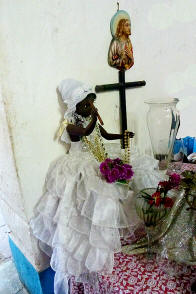
Obatala doll |
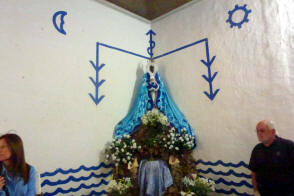
Santeria shrine to Yemaya |
After just a few minutes, way too little time to explore the
Plaza, our guide led us back down the street to what apparently was a temple
fot Santeria, the blend of African religions and Catholicism. It looked like
private home, and in fact a family was living there. But there were rows of benches
(pews?) facing a large room with a traditional doll representing Obatala
(St. Mercedes) and a corner shrine toYemaya (Ocean Mother).
At this point our guide led the group to the courtyard of a bar, primarily so we could use the toilets. With 30 of us
from the
bus and only one toilet for each gender, it took at least 30 minutes before we could move on.
In the meantime, Darrell slipped out to to take pictures on the sreet outside
the bar.

Waiting at the bar |
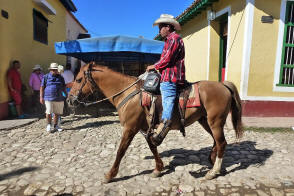
Passing horseman |

Bougainvilla on garage |
|
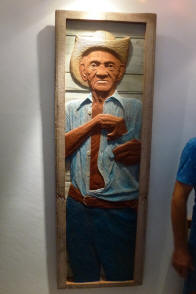
Painted wood carving
|
Our group finally left the bar at 11:30, and led usour
through the narrow streets to the east end of the Plaza Major. On the way we
stopped at a wood carving shop with unusual painted bas relief portraits
that were very life-like. Entering the Plaza, we stopped at the
Museum of Colonial Architecture, but did not go inside.

Our group at Museum |

A peek into the Museum |

Interior of Trinity Church |
We then walked around the east end of the Plaza to the popular
cobblestone Colonial Steps by the Casa Musica. It was about 12:15 so the
steps were clear, but in the evening there is live music and they become
quite crowded. We climbed the steps to the Church of the Most Holy
Trinityand went inside. The interior was quite simple except for the
magnificent carved wooden altar.
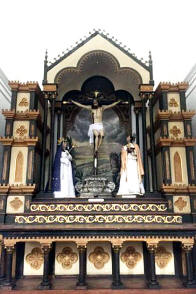
Lord of the True Cross |
In the sanctuary, however, is the Lord of
the True Cross (El Señor de la Vera Cruz), the highlight of the Church. In the 17th century this wooden statue was being shipped
from Cuba to a church in
Veracruz, Mexico, but the ship carrying it was pushed back to Trinidad three
times by bad weather. The captain had to leave behind some of his cargo, including the
statue, in order to continue his journey. Perceiving this as divine
sign, the people of Trinidad decided to house the statue in
their own church.
Finally, at 12:30, we walked to a large
restaurant nearby. It was 12:30. Our time in Trinidad was fast dwindling, and
we felt we had not seen very much. An elaborate buffet was laid out in a
huge dinning room, but the food was not very good. On the way out, we saw a 1920s Model-T
Ford Touring on display.
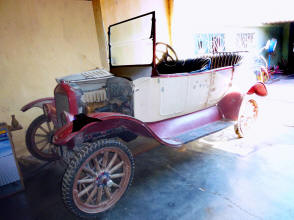
Ford Model-T Touring
|
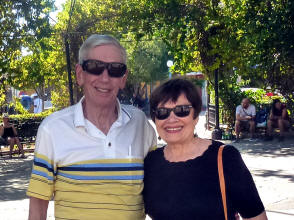
Darrell & Jane |
We stopped in the wooded plaza outside the
restaurant for some pictures. Then it was back on the bus for our return
trip to Cienfuegos. We had been in Trinidad for just three hours, but nearly
half that time had been spent at the bar and restaurant. Still, we had
managed get at least a glimpse of most of the high lights. CIENFUEGOS
We came into the city on Calzada Maximo Gomez, a street that goes
almost directly to the cruise terminal. The terminal was in the oldest part of the city, though, and
the bus drove us around so we could see some of the historical area before boarding. We drove
around Jose Marti Park, past the Governor’s Palace, Casa Ferrer, the
Cahedral, and other 19th century
buildings.
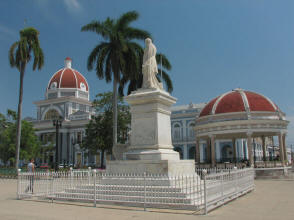
Cienfuegos Municipal Building |

Casa Valle
Governor's Palace |

Cathedral
|
We were back on board at 3:30 and rushed to the lounge for Sandy’s 3:45 lecture on Cuba Since
the Revolution. The ship sailed at 4:00. After dinner in the main dining room, we went back to
the lounge for the 9:30 show, featuring Uraguyan guitarist Nestor Santurio. He played very well,
but with a big fake grin on his face almost constantly.
Page
1
2
3
4
5
6
7 |